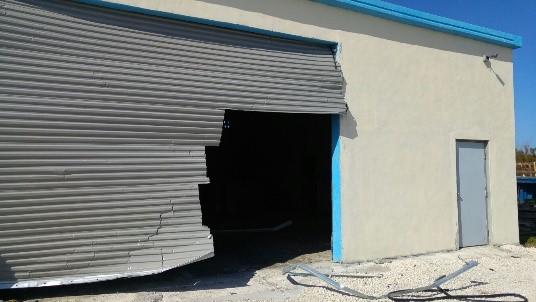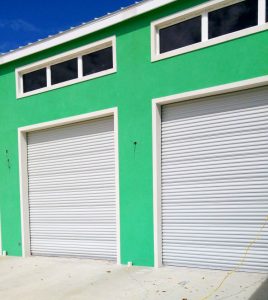DBCI Blog
The Power of Innovation. The Strength of Commitment. Steel roll-up door tips, tricks and industry updates from DBCI.
Wind-Rated Steel-Curtain Roll-Up Doors: Saving You Time and Money in Extreme Weather
Wind-Rated Steel-Curtain Roll-Up Doors: Saving You Time and Money in Extreme Weather
Wind-Rated Steel-curtain roll-up doors are a great fit for commercial, self-storage, freight and warehousing, industrial and recreational industries for a myriad of reasons. They provide long-term value due to their inherent functional benefits including space savings, increased longevity, and easy and infrequent maintenance requirements. Additionally, steel-curtain roll-up doors can also be wind-rated to protect your property from devastating and unpredictable weather events including tropical storms and hurricanes. In these dangerous conditions, installing high-quality, wind rated steel-curtain roll-up doors can be the difference between keeping your business secure and running, or losing property and income.
What is a wind-rated door?
Wind rated steel-curtain roll-up doors are designed to resist the impact of forceful gusts associated with extreme, wind-related weather events that can cause doors that aren’t wind rated to buckle or bow, become misaligned from the tracks or even totally collapse or separate from the framing. In addition to standing up against extreme wind, they are also built to protect the entire building envelope, which is imperative to keeping the walls intact and minimizing the risk of losing the roof and other building components.
Do you need a wind-rated door?
Doors tend to be more vulnerable to damage than other portions of a building envelope as they represent the largest opening/break in the structural base. This is particularly true in coastal areas as they are more susceptible to extreme weather events that bring with them perilous gale-force winds. This includes areas along the Gulf of Mexico from Texas to the southern tip of Florida and the shores of the Atlantic from the southern tip of Florida to Massachusetts. These areas are often governed by federal and state-specific building codes and insurance requirements as a result of their susceptibility to sustaining wind-related building damage. To learn more about the requirements in your area, the 2015 International Building Codes (IBC) as published by the International Code Council (ICC) are available for purchase/download here. Additionally, your local building code authority can provide current information and a professional door technician can perform an on-site inspection to ensure compliance.
The survival of your door is vital to the survival of the entire building. Post-disaster investigations conducted by the Federal Emergency Management Agency (FEMA) show that when doors do not adequately resist winds generated from storms, additional damage often follows as the interior is now exposed to the elements, the results of which can be devastating and costly. If a building is breached due to the failure of a door to resist wind forces, the results can include rot and fastener corrosion, weakened door frames, interior finish damage and mold growth. In additional to potential damage to non-structural elements, the increase in pressure that results from door failure can cause significant damage to your building’s structure—including your roof. This damage can even result in the complete structural failure of the entire building.
How do wind-rated steel-curtain roll-up doors perform in extreme weather?
Pineyard Steel experienced the difference a high-quality, wind rated steel-curtain roll-up door makes first-hand thanks to Hurricane Matthew. Striking Pineyard’s facilities in Freeport, Grand Bahama on October 5, the storm shut down the city’s port, schools, hospitals, banks and airport, and the community is still struggling to regain services including power and internet access. Preliminary estimates reveal that Matthew has caused more than $6.9 billion in damage, with much destruction yet to be quantified. These conditions are a direct result of not just rising water, but also wind damage.
Pineyard Steel features warehouses outfitted with roll-up doors of varying quality as the owners are in the process of upgrading to wind-rated doors. Below is a comparison of the lower quality steel doors followed by the wind-rated steel curtain roll-up doors provided by DBCI that withstood the effects of Hurricane Matthew without any damage.


How can I tell if my existing roll-up doors are wind-rated?
In cases where buildings have been previously owned, whether your door is wind-rated or not may not be obvious. If it is wind-rated, there should be a sticker on the door that informs you of the pressure the door has been designed to accommodate. The door will also include a label indicating the impact-resistance rating if it has been designed as such. If you are unsure, have a professional door technician inspect it to ensure it is the appropriate model for your geographic area and ask them to demonstrate how to properly secure the door during a storm.
Can I just add reinforcements?
Unfortunately, retrofitting an older door with new hardware is not sufficient to meet new building codes as it will not endure adequate protection. If you have purchased or inherited a door that requires reinforcing, you can purchase an “add-on” system, which requires the building owner to install long posts in the floor and ceiling to reinforce the door before a storm hits, and also requires that they are removed afterward to resume normal operation. DBCI’s models are designed and manufactured with the reinforcement contained within the structure of the door and therefore require no advance set-up. Additionally, DBCI door are tested in our in-house wind-testing facility that simulates gale-force winds to make sure the doors we provide withstand major wind events. This saves time and money and is especially convenient in the occurrence of an evacuation notice or unexpected high wind event.
To learn more about wind-rated doors, view our wind-certified doors online or contact a DBCI representative.